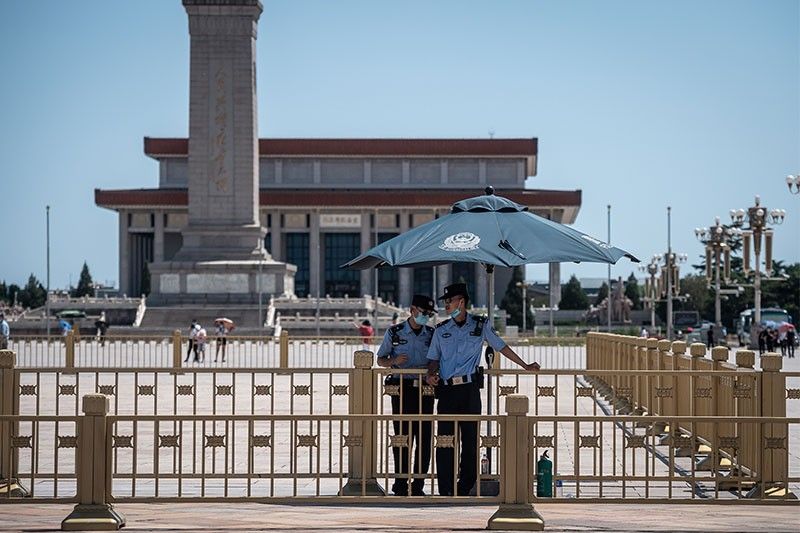Raising speech fears, Zoom briefly shuts account over Tiananmen

WASHINGTON, United States — Zoom said Wednesday that it had temporarily closed a US account of activists who met to mark the anniversary of China's crackdown in Tiananmen Square, raising alarm over free speech on the fast-growing video-meeting service.
US-based rights campaigners turned to Zoom, which has become a way of life for many people during the coronavirus lockdown, to connect more than 250 people to remember Beijing's crushing of the pro-democracy uprising on June 4, 1989.
The group Humanitarian China said it had brought in numerous participants from inside China, which has tried to erase memories of the bloodshed — and that its paid Zoom account was shut down without explanation one week later.
The shutdown was first reported by news site Axios.
Zhou Fengsuo, a co-founder of the group who was number one on Beijing's most-wanted list after the Tiananmen crackdown, told AFP that the Zoom account was reactivated on Wednesday.
Zoom acknowledged that it had shut down and restored the account after the attention.
"Just like any global company, we must comply with applicable laws in the jurisdictions where we operate," a Zoom spokesperson said.
"When a meeting is held across different countries, the participants within those countries are required to comply with their respective local laws.
"We aim to limit the actions we take to those necessary to comply with local law and continuously review and improve our process on these matters."
The activists voiced outrage, charging that the company may have been under direct pressure from China's communist leaders.
"If so, Zoom is complicit in erasing the memories of the Tiananmen Massacre in collaboration with an authoritarian government," Humanitarian China said in a statement.
It called Zoom an "essential" resource in reaching audiences inside China, which rigorously enforces censorship.
Long dilemma for US tech
Zoom reported Tuesday that its earnings had soared in the quarter ending April 30 as both companies and friends, cooped up inside due to COVID-19 lockdowns, embrace the platform to meet virtually.
Its rapid growth has not been without previous problems, with the company forced to confront a rash of racists and other unwelcome gatecrashers who hack into Zoom sessions.
Beijing has developed a sophisticated "Great Firewall" that aims to keep out news that is damaging to the leadership.
Authorities go to extraordinary lengths each year to ban commemorations of the Tiananmen crackdown, in which the military killed hundreds of unarmed protesters — by some estimates, more than 1,000 — who had packed the capital to seek reform.
PEN America, the literary group that defends free speech, denounced Zoom's move.
"We wouldn't tolerate it if a phone company cut off service for someone expressing their views in a conference call; we shouldn't tolerate it in the digital space either," said the group's CEO, Suzanne Nossel.
"Zoom portends to be the platform of choice for companies, school systems and a wide range of organizations that need a virtual way to communicate, especially amid global lockdown. But it can't serve that role and act as the long arm of the Chinese government," she said.
With its alluring market, China has long been problematic for US tech giants that generally boast of allowing unfettered free speech at home.
Apple in 2017 acknowledged that it bowed to Chinese law by removing apps for VPNs, or virtual private networks, that let its users evade local controls.
A decade earlier, Yahoo faced intense criticism and conceded wrongdoing after helping Chinese officials identify pro-democracy advocates who posted on online message boards.
The latest news about Facebook, Twitter, Instagram and other social media platforms.
Messaging app Telegram will launch pay-for services in 2021, its Russian-born founder Pavel Durov says Wednesday, as the growing company needed "at least a few hundred million dollars per year".
"Telegram will begin to generate revenue, starting next year," he says in a statement. "We will be able to launch countless new features and welcome billions of new users." — AFP
The Bureau of Immigration has issued a ban on employees posting content on TikTok of them dancing or performing social media challenges while in uniform.
Immigration Commissioner Jaime Morente says in a press release that the prohibition "was imposed to strictly enforce the bureau's regulations on the wearing of the BI uniform, whose integrity must be upheld at all times because it represents the institution of the Philippine immigration service."
"Our policy on the wearing of the BI uniform is clear. As public servants and supposed model Filipinos, employees must proudly wear their uniform at all times, present a professional image to the public and observe proper decorum and good taste in all their actions while they are on duty," he also says.
A souce says shortform video app TikTok and the Trump administration had not come to terms over sale of the company's US operations late Friday as a deadline loomed.
The Committee on Foreign Investment had given TikTok parent ByteDance, based in China, until midnight to come up with an acceptable deal to put TikTok's American assets into US hands.
Talks between TikTok and government negotiators will continue even after the deadline passes, and people in the US will still be able to use the popular smartphone app for sharing video snippets, the source says. — AFP
Twitter on Tuesday rebuffs Australian calls to remove a Beijing official's incendiary tweet targeting Australian troops, as China doubled down on criticism in the face of mounting international condemnation.
Chinese foreign ministry spokesman Zhao Lijian sparked outrage in Canberra on Monday when he posted a staged image of a man dressed as an Australian soldier holding a bloody knife to an Afghan child's throat.
The post came just days after Australian prosecutors launched an investigation into 19 members of the country's military over alleged war crimes committed in Afghanistan between 2005 and 2016.
Twitter says it had marked the tweet as "sensitive," but adds that comments on topical political issues or "foreign policy sabre-rattling" by official government accounts were generally not in violation of its rules. — AFP
Facebook and Google are fast becoming "human rights-free zones" in Vietnam, Amnesty International warns Tuesday, accusing the tech titans of helping censor peaceful dissent and political expression in the country.
Communist Vietnam has long jailed its critics but has come under fire in recent years for targeting users on Facebook, a popular forum for activists in the country where all independent media is banned.
The social network admitted earlier this year that it was blocking content deemed illegal by authorities, while its latest transparency report revealed a nearly 1,000-percent increase in the content it censors on government orders compared to the previous six months.
Amnesty said in a Tuesday report that it had interviewed 11 activists whose content had been restricted from view in Vietnam by Facebook this year. — AFP
- Latest
- Trending






























